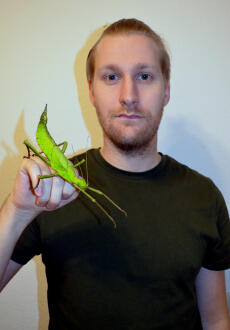Marius Pohl

Molecular Evolution and Sociobiology
Institute for Evolution and Biodiversity
University of Münster
Hüfferstr. 1
48149 Münster, Germany
Phone: +49 251/83-210921
m_pohl16@uni-muenster.de
Nationality: German 
Influence of genetically modified organisms and their substances on indirectly affected organisms, ants (Formicidae)
The use of genetically modified organisms, such as GM maize, is used to control certain parasitic insects and thus increase the yield of the crop. The respective pests are thereby killed by certain substances, e.g. Bacillus thuringiensis (Bt) cry toxins. So far, only the influence of such substances on direct other organisms has been tested, i.e. those that have direct contact with the genetically modified plants. It is not yet known whether and what influence these substances have on indirectly influenced organisms, such as ants. Since many species of ants in Germany are omnivorous, which means that they feed on both plant and animal sources, they can also accumulate these substances in the organism by consuming insects that have previously been killed with Bt toxins. Furthermore, ants have a social stomach, i.e. that certain workers go actively hunting and collect food, which is later passed on to other workers, brood and also the queen, through so-called trophallaxis (choking up food). The whole colony is thus affected by the respective substance and exposed to the respective effects. Thus, ants can also serve as bioindicators for the influence of genetically modified organisms on indirectly influenced organisms and thus help to confirm or refute an exact specificity of the substances.
In my project, 3 omnipresent German ant species should be used to develop a standardized and replicable method to check the influence of genetically modified organisms and their substances. This includes, among other things, the development of optimal keeping and rearing conditions for ants under laboratory conditions and an efficient method for administering the respective substances. Some of the main investigations are the influence on the fertility of the queen, an increased accumulation of toxins in larvae or queen, as these require significantly more resources, and a general lethality with regard to the colony.
Pohl M.; Hommen U.; Eilebrecht S.; Schäfers C.; Gadau J.; Otto M. 2024. Ants are no bees – Gaps in the assessment of relevant exposure routes to pesticides and plant incorporated protectants. Environmental Chemistry and Ecotoxicology 6: 71–80. doi: 10.1016/j.enceco.2024.02.001.
Pohl, M., Frank, E. T., & Gadau, J. (2023). Socio-and population-genetic analyses of two West-African ponerine species (Megaponera analis and Paltothyreus tarsatus) with winged and wingless queens (Hymenoptera: Formicidae). Myrmecological News, 33. - doi: 10.25849/myrmecol.news_033:077
Schwarz, C. J., Pohl, M., & Frank, E. T. (2023). A preliminary checklist of the praying mantids of Comoé National Park, Ivory Coast (Insecta: Mantodea). Zootaxa, 5373(1), 1-64. - DOI: 10.11646/ZOOTAXA.5373.1.1
Buellesbach J.*, Rinke J.*, Thomas, J.M., Reuter L., Hartmann V., Pohl M., Gadau J., Ernst U.R. (2023) “Worker policing independent of strikingly different egg chemotypes in carpenter ants”, Evolutionary Ecology (*Authors contributed equally)